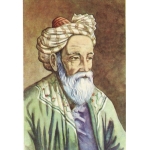Fair was the morning, fair our tempers, and
We had seen nothing fairer than that land,
Though strange, and the untrodden snow that made
Wild of the tame, casting out all that was
Not wild and rustic and old; and we were glad.
Fair, too, was afternoon, and first to pass
Were we that league of snow, next the north wind.
There was nothing to return for, except need,
And yet we sang nor ever stopped for speed,
As we did often with the start behind.
Faster still strode we when we came in sight
Of the cold roofs where we must spend the night.
happy we had not been there, nor could be.
together long.
“How quick” to someone's lip
The words came, “will the beaten horse run home.”
The word “home” raised a smile in us all three,
And one repeated it, smiling just so
That all knew what he meant and none would say.
Between three counties far apart that lay
We were divided and looked strangely each
At the other, and we knew we were not friends
But fellows in a union that ends
With the necessity for it, as it ought.
Never a word was spoken, not a thought
Was thought, of what the look meant with the word
“Home” as we walked and watched the sunset blurred.
And then to me the word, only the word,
“Homesick,” as it were playfully occurred:
No more.If I should ever more admit
Than the mere word I could not endure it
For a day longer: this captivity
Must somehow come to an end, else I should be
Another man, as often now I seem,





















Comment form: